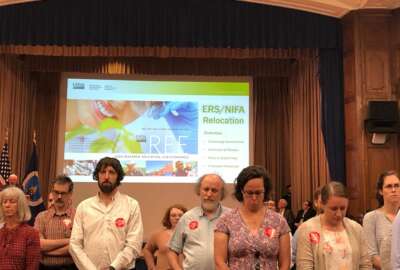
USDA relocation could cut existing ERS, NIFA workforces in half
Roughly 57% of employees given relocation notices at the Economic Research Service and 67% of such employees at the National Institute of Food and Agriculture have...
The Agriculture Department’s two research bureaus are in line to lose about half of their employees initially chosen to relocate to Kansas City.
About 72 of 171 employees given reassignment notices at the Economic Research Service have accepted the USDA relocation, and 99 — roughly 58% — have declined, according to a USDA spokesperson.
But the National Institute of Food and Agriculture could lose a greater portion of its workforce. To date, 73 NIFA employees have accepted relocation and 151 have declined, according to the department. Put another way, roughly 67% of the 224 NIFA employees who received reassignment letters have rejected relocation.
About 76 ERS positions and 21 NIFA positions will remain in Washington, D.C., metropolitan area, USDA said.
Politico first reported on the number of USDA employees who have accepted or declined relocation.
Still, USDA’s relocation numbers to date fall short of the projections the department provided when Secretary Sonny Perdue announced his decision to relocate the ERS and NIFA headquarters to Kansas City about a month ago.
Related Stories
The American Federation of Government Employees, has said a few dozen employees have already left the agency, which may account for the gap. Employees at ERS and NIFA formed collective bargaining units with AFGE earlier this year, largely in reaction to USDA’s relocation plans.
ERS and NIFA employees had until July 15 to inform USDA of their relocation decisions.
Not all employees have responded to their reassignment letters, USDA said, which the department has taken to mean that they have declined relocation.
“We expect these numbers may fluctuate until Sept. 30, the report date to the Kansas City region for relocating employees, as employees are free to change their status until that date,” a USDA spokesperson said in a statement. “These anticipated ranges were taken into account in the department’s long-term strategy, which includes both efforts to ensure separating employees have the resources they need as well as efforts to implement an aggressive hiring strategy to maintain the continuity of ERS and NIFA’s work.”
Those who choose to move to Kansas City will receive relocation instructions in the coming weeks. Employees who declined relocation have been getting removal letters from the department, Kevin Hunt, acting vice president of the AFGE local representing ERS employees, said.
Hunt is one of the 99 ERS employees who aren’t planning to relocate to Kansas City. For them, their last day at USDA will be Sept. 27, he said.
Perdue and USDA have maintained that no ERS or NIFA employee will be involuntarily separated, but they ultimately have to relocate to their keep their jobs.
Employees who don’t agree to relocate will be given priority consideration for preferential hiring within the agency, USDA said in its own collective bargaining proposals given to AFGE.
But employees must work quickly if they want to take advantage of USDA’s career transition assistance plan. Employees are only eligible from the time they receive a removal notice until the date they leave their current positions, USDA said. They must stay on the agency’s personnel rolls to be eligible for priority job consideration.
Meanwhile, both USDA and the two local unions representing ERS and NIFA employees are preparing to bargain over relocation. Ground rules negotiations are expected to begin this week, Hunt said.
The department is poised to give ERS and NIFA union representatives official time for the term negotiations, according to USDA’s proposed ground rules.
Both the ERS and NIFA local unions had submitted demands last month to bargain over the USDA relocation. They asked the department to conduct a civil rights impact analysis for the move and requested written confirmation from USDA that it would pay relocation expenses for employees who agree to move.
They also asked that USDA give ERS and NIFA employees a relocation bonus on top of moving and other related expenses.
USDA’s bargaining proposals show some indication of what the department will argue for in upcoming bargaining negotiations.
USDA rejected the union’s push for relocation incentives, because the department is placing ERS and NIFA employees who agree to move on “relocation orders.”
Through relocation orders, house hunting, travel and moving expenses will be covered, USDA said. Employees will also receive a relocation income tax allowance, and other expenses associated with selling their homes or ending their leases will be covered.
USDA also appears ready to accept employees’ applications for Voluntary Separation Incentive Payments, according to the department’s proposals.
More questions about USDA relocation

Members of Congress on Tuesday reiterated their opposition to USDA relocation.
In a letter to the secretary, Sen. Chris Van Hollen (D-Md.) questioned the department’s anticipated timelines for relocation.
The General Services Administration last week extended the deadline for proposals to lease space in the Kansas City region. The new deadline is Aug. 7, one month after GSA’s original July 7 date.
“It is our understanding that the process of securing and building out a new space in Kansas City could take up to two years,” lawmakers wrote. “This predicament makes it nearly impossible for your employees to determine where they will be living, where to send their children to school and other important decisions until they know where the final office space will be located in Kansas City.”
Maryland Sen. Ben Cardin (D), along with Virginia Sens. Tim Kaine (D) and Mark Warner (D), Patty Murray (D-Wash.), Debbie Stabenow (D-Mich.) and Sherrod Brown (D-Ohio), were signatories on Van Hollen’s letter.
Much of the Maryland delegation, including House Majority Speaker Steny Hoyer (D) and Democratic Reps. Anthony Brown, Jamie Raskin, Dutch Ruppersberger, John Sarbanes and David Trone, as well as Virginia House Democrats Don Beyer, Gerry Connolly and Jennifer Wexton also signed onto the letter.
Beyond the timelines for USDA relocation, members also expressed concern for the agency’s apparent attrition.
“We know you care deeply about improving customer service at the department,” members wrote. “However, customers cannot be served if there are not an adequate number of employees to get the job done.”
Copyright © 2025 Federal News Network. All rights reserved. This website is not intended for users located within the European Economic Area.
Nicole Ogrysko is a reporter for Federal News Network focusing on the federal workforce and federal pay and benefits.
Follow @nogryskoWFED





